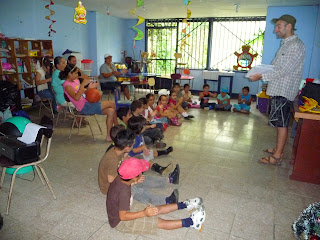It’s been a flurry of activity
with the first onset of international guests! We had an informative week with
Dr. Richard Komp building solar ovens and as my time here comes to a close, I’m
working hard to finish up a few final projects.
Visiting from Canada are Charlene
and Sally, with whom I have luckily been able to team up with to fix up a few
places and spaces. Sally and I are putting together an information board and area
map, which we hope will help provide visitors and tourists with a better idea
of Salado Barra. So far, we’ve sketched out the various canals and have spoken
with local guides about what species – both flora and fauna – we are most
likely to find in each. Given that Salado, like all systems, is both social and
ecological, we are also trying to integrate some of the lesser known aspects of
the community including historic sites such as the Casona as well as local
businesses including restaurants, the solar workshop, jewelry-making and we are
even thinking of organizing community-based homestead tours!
Alongside the information board
and area map, we’re also keeping busy getting the café up and running. While
it’s been a bit slow getting everything organized and permission to go ahead
with certain changes, I have drafted up some permaculture designs for the
garden, and slowly but surely, we are moving forward. We hope that the café
will serve as a getaway for tourists, providing a relaxing safe haven of warm
banana bread, coconut tabletas, fresh squeezed juice and a nice swing in the
hammock. We also hope that the café will offer a venue for the community’s
micro-enterprises to set up shop, selling solar cell phone chargers, jewelry,
dried fruit, and local products. Needless to say, the next month will be a
perfect bustle with which to end my stay.
As I was filling out my final
reports for FBC, I was thinking about all the many things that made this
experience as amazing as it was. There is something really cool about coming
into a totally unfamiliar space as an absolute stranger and to actually feel
the community learning about you, understanding you, trusting you, and opening
up to you. Of all the experiences I have had here, I think this is the one that
stands out the most; developing a sense of belonging, a sense of caring and
being cared for, and more than anything, a sense of being part of something
bigger. It’s not the trips around the country nor the nights out in Ceiba that
have made this experience what it is, it’s the people we share our days with.
It’s sitting in the kitchen of Dona Irma surrounded by sons and
daughter-in-laws, sisters and brothers, eating pastelitos and drinking thick
coffee. It’s building sand castles on the beach with Kenya and Edouin or
listening to the spray of water against the side of the lancha as David
navigates us through the mangroves by moonlight and stars. It’s a campfire on
the beach, a tortilla-making session, a game of hide-and-seek, a gift of fried
fish, a motorcycle lesson, a game of pool. It’s seeing real smiles on peoples’
faces, hearing real excitement in their voices, and feeling real hugs when they
greet you. It’s a sense of home.






















